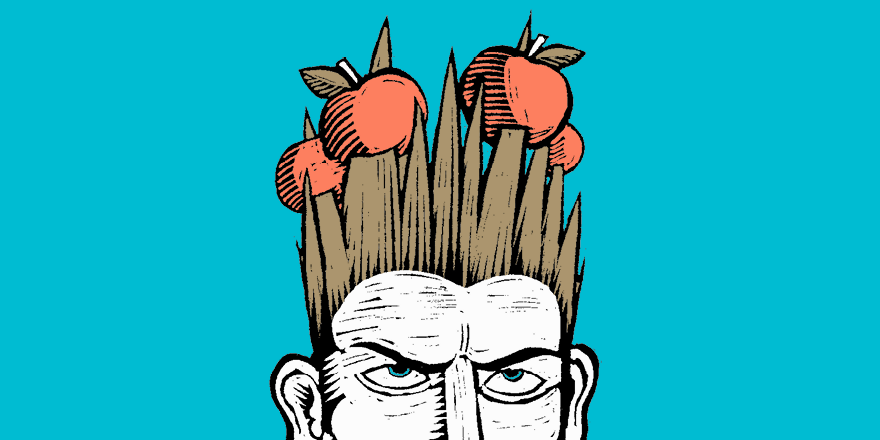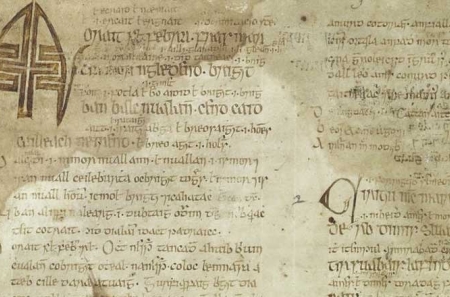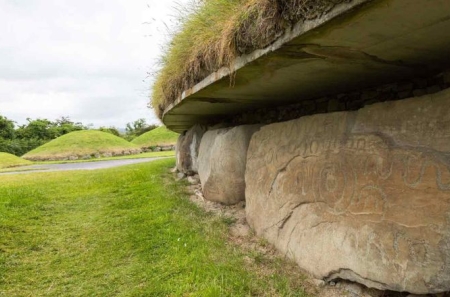
Bringing medieval Irish into the classroom with 'A history of Ireland in 100 words'
22 October 2020After the book and the exhibition, we're now working on educational resources based around extracts from tales, poetry and historical texts composed in the Middle Ages.
A history of Ireland in 100 words, published in October 2019, was written primarily to tell the story of Gaelic Ireland over the centuries through words used by its people. At its base was a treasure-trove of medieval Irish vocabulary, the electronic Dictionary of the Irish Language. Almost inevitably, the book delved into areas that had been neglected by traditional history books: an array of medieval terms for washing different parts of the body were identified, references to tattooing in medieval Ireland were brought to light, and an Irish phrase offered insight into the concept of ‘fair play’.
Since its launch, activity around 100 Words has developed in various directions. In March 2020, to mark Seachtain na Gaeilge, an initiative sponsored by Dublin City Council saw the streets of the city lined with banners featuring artwork and captions from the book. At the same time, a social media campaign to find our favourite Irish words attracted hundreds of responses using the hashtag #RIA100Words. Plans for a mobile exhibition were temporarily shelved in the Spring, but the display was unveiled again at LexIcon, Dún Laoghaire, in September and travelled also to the Linenhall Library, Belfast, at the start of October. Most importantly, generous funding from the UK Arts and Humanities Research Council has enabled the work which began with 100 Words to mature into an ongoing project, ‘Spreading the Word(s)’. Extracts from the book were highlighted in this year’s British Academy Summer Showcase, a series of recordings for MoLI Radio prompted a batch of new material, and a body of resources is currently being produced for use in schools and other learning environments.
![]() Launch of our mobile exhibition at dlr LexIcon. L-R: Dr Marian Thérèse Keyes, Senior Executive Librarian, dlr LexIcon; An Cathaoirleach, Cllr Una Power; Ruth Hegarty, RIA Managing Editor.
Launch of our mobile exhibition at dlr LexIcon. L-R: Dr Marian Thérèse Keyes, Senior Executive Librarian, dlr LexIcon; An Cathaoirleach, Cllr Una Power; Ruth Hegarty, RIA Managing Editor.
The creation of these resources was inspired to some extent by the educational materials which accompany Fintan O’Toole’s book A history of Ireland in 100 objects. In time, we expect that ten units based on 100 Words will be available online in both English and Irish versions. These units have been designed and written with guidance from a cohort of teachers and former teachers, some of whom became involved with the project after attending workshops in Cork and Belfast last year, while others responded to invitations extended via social media under the auspices of ‘Spreading the Word(s)’. These teachers represent subject-areas including Irish, History, Geography and Religious Studies, and are drawn from both Northern Ireland and the Republic of Ireland.
The planned resources are aimed mainly at the 11-14 age-group, who will be engaged (hopefully!) by learning-materials built around words from the book such as mac tíre ‘a wolf’, gruaig ‘hair’, ceol ‘music’, réalta ‘a star’ and dalta ‘a pupil’. The selected entries allow teachers to explore aspects of Irish culture and history – the medieval practice of fosterage, traditions of hospitality, conventions of everyday dress and appearance in pre-modern times, and so on – but the entries drawn from A History of Ireland in 100 Words act also as spring-boards into wider issues relevant to the present-day: the extinction of the wolf in Ireland sparks a debate about the maintenance of natural ecosystems; the lesson on medieval shoes dips its toe into science and the preservative qualities of bogs; what begins as an exploration of early Irish writing and books ends with a look at the digitisation of manuscripts; and the unit on medieval music ultimately asks the class to think about information about the past which simply cannot be recovered. As the Irish language is at the heart of all 100 Words activities, not only will the learning resources be available in Irish but all of the units will incorporate also language-based exercises, working with anglicised place-names, kennings, and borrowings from Latin (for example). In keeping with the ‘whole-curriculum’ approach, suggestions for art, drama, creative writing and field trips are included too.
The elements of the resources about which we most excited are the extension exercises. Encouraged by the teachers who have advised the project, a number of advanced resources are being produced. Targeted at older and more able students, the learning intentions here focus on improving thinking skills and critical approaches to source-material. Based around extracts from tales, poetry and historical texts composed in the Middle Ages, teachers can use these units to consider, for example, whether it is valid to cross-compare archaeological evidence and textual sources from different time-periods, and when it can be confidently claimed that a story-motif has been borrowed from the literature of another country. These resources may well represent the first attempts to bring medieval Irish into the classroom to illustrate teaching-points not directly relevant to the language itself. Of course, all extracts from the early Irish will be available in accessible Modern Irish and English versions, but the set activities require students to look closely at originals as well.
The learning resources derived from A history of Ireland in 100 words are being trialled currently and should be available early next year. We hope that they will stimulate interest in the history of Gaelic Ireland and in more than 100 Irish Words!
With thanks to the teaching professionals who have freely offered advice and enthusiasm and to whom we are truly indebted: Liam Dempsey, Ellen Hallinan, Grainne Henry, John Kelly, Catherine Mairs, Christine Melby, Edel Ní Loingsigh, Eoin Ó Donnchadha, Trudy Rossiter, Jim Ryan, Miriam Uí Dhonnabháin.
Sharon Arbuthnot, October 2020
A history of Ireland in 100 words is one of the many educational resources developed by the Royal Irish Academy. You can explore the full range on our dedicated page.



